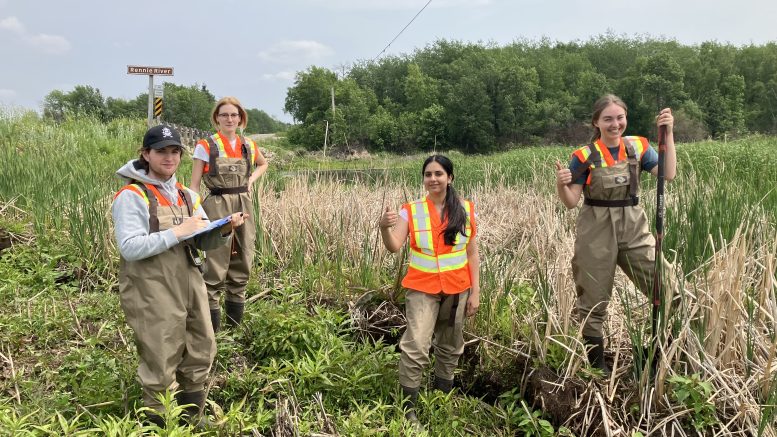This summer, the Undergraduate Research Award (URA) program welcomed over 200 students, allowing them to work alongside researchers across all disciplines.
Third-year biological sciences student Sarah Cameron worked with assistant professor Az Klymiuk as a URA student. Through the research award for undergraduate students that runs from May to August, Cameron was able to study the occurrence of fungi within the root systems of wetland plants.
Cameron’s research journey involved both fieldwork and laboratory work. Alongside Klymiuk and other lab members, Cameron went out to Whiteshell, Nopiming and Duck Mountain provincial parks.
They collected plant roots, which were later processed in the lab. Cameron used clearing, staining and microscopy techniques to examine and count fungi in the roots.
One of the most valuable skills Cameron acquired from her URA experience was effective time management. She planned her research timeline, collected data and completed tasks within a set timeframe, preparing her for the poster competition — where students present their work at the end of the summer.
Looking ahead, Cameron plans to continue her research journey by pursuing a co-op degree and potentially returning to Klymiuk’s lab.
For Lala Rukh and Chase Gurniak, both fourth-year biological science students, the summer research was through the Philip Hultin pedagogy award fund, under Klymiuk’s supervision.
Gurniak’s project assisted in developing new laboratory experiments and techniques for fungi and lichens courses.
His project involved studying the diversity of fungi found in goose dung and developing laboratory protocols on techniques for culturing, isolation, purification and slide preparation. These skills will be shared with students this fall semester.
One of the most valuable takeaways from Gurniak’s research experience was the opportunity to learn and practise a wide array of laboratory techniques, from photomicrography to sterile technique and culturing media preparation.
“I’ve just not had the opportunity during my education yet to practise these techniques,” he said.
“I thought that was the best part, being able to work in a setting where I was able to get so much freedom with such a respectable crew of lab mates and professor.”
Rukh’s projects, on the other hand, were geared towards creating new lab experiments and techniques for the plant anatomy course.
She worked on isolating plant cells by removing the cell walls from various plant species, and other experiments to grow miniature plants and tissues in test tubes.
“We’re hoping that this will provide a more greater understanding of students in plant anatomy,” she said.
In addition to lab work, the research program offered a holistic experience for Rukh — including meeting other student researchers, engaging in workshops on scientific skills, learning how to write research papers and gaining insights into the world of academia.
“I feel like undergraduate research is a great opportunity for students because working the summer term, it makes you realize whether you want to do this long term or not, whether it’s something that interests you,” she said.
Maryem Zahra, a fourth-year sociology and criminology student, worked with department of sociology and criminology professor Laura Funk on a Social Sciences and Humanities Research Council project titled “Strengthening Care Mobilization in Canada’s Social Welfare State,” which aimed to amplify the voices of individuals who support older adults but may have conflicted or uncertain feelings about their caregiving roles.
“The goal is to broaden the range of voices in research on helping older adults and learn how these people provide help or what advice they have for policy makers about caring for older adults,” Zahra explained.
Over the summer, Zahra conducted individual interviews with participants, transcribed the data and proofread transcripts — sharing her findings with the rest of the team and analyzing the data.
Zahra’s role in the project allowed her to connect with real people facing challenging caregiving situations.
“I’m also working on crafting papers in the fall,” she added. “I’m going to be co-authoring a publication alongside Funk which is my favourite part because undergrad students don’t really get many opportunities to author publications.”
Zahra expressed her hope that the data collected would lead to improved policies and support systems for these individuals.
Zahra plans on continuing her journey in research and to potentially transition into policy analysis — aspiring to bridge the gap between research findings and actionable policies and striving to make a tangible impact on society.
She encouraged incoming students to explore research opportunities and advised them to take their time discovering their interests and potential research topics, as the URA experience can provide an invaluable head start in a research-oriented career and equip students with essential skills.
Currently in her final year as a psychology student, Kezia Wong first worked with department of sociology and criminology professor Lori Wilkinson under the URA program in 2022.
Wong has a passion for social psychology, which aligned with Wilkinson’s research.
For her second summer back on Wilkinson’s team, Wong contributed to two projects — one centred on vaccine hesitancy, exploring the factors influencing individuals’ decisions, while the other project delved into housing issues faced by recently resettled African refugees in Canada.
A typical day for Wong involved sorting through literature reviews using resources like Google Scholar and libraries, data analysis and collaboration with other team members.
As Wong reflects on her experience, she encourages prospective students to start early when searching for research opportunities, emphasizing the importance of contacting professors well in advance.
“I think it’s a really great opportunity for any student who’s interested in research.”


